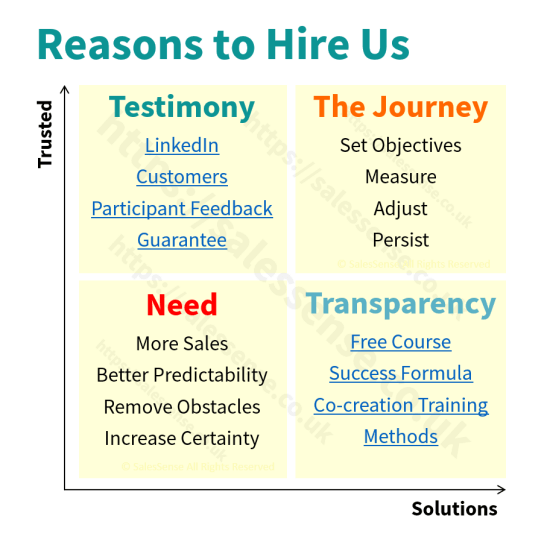Improve profit, terms, and satisfaction through sales negotiation skills training.

Do you conceed too much in negotiations? Take a shortcut. Schedule a call and tell me what you are looking for. I'll share what I know. Reach out today for a sales negotiation skills training special offer.
Take this sales negotiation skills training course to protect your margin and profit while protecting the customer's win.
How can I learn negotiation skills?
There is much free advice online including self-led negotiation skills training in our free B2B sales course. Pick out what appeals and apply what you learn in safe situations to find out what works for you. If you find it more effective to have a coach or join a course, book a trial session with the author of this course.
What is the best negotiation skills training?
- Training based on best-practice research and the experiences of professional negotiators.
- Studying the principles and methods in advance and using classroom time to develop skills through practise.
- The co-creation of workplace actions for embedding learning in participant routines and habits.
- The opportunity for one-to-one learning.
- Delivery by the course author.
- See our guarantee.
Sales Negotiation Skills Training Course
Negotiating can be practised almost every day and practise is what it takes to become an effective negotiator. That is why this sales negotiation skills training course is based on a series of simulation exercises.
Effective sales negotiation leaves customers feeling good about a purchase while preserving profit margins. Learn proven ways to maximise profit while helping the other party feel good about the result. Sharpen listening skills to have your position adopted by the other party. Discover the hidden value that opens the door to a win/win result. Learn how to transform a combative opponent into a collaborating friend.
Course Objectives
- Increase profit and customer satisfaction.
- Deflect tricks and ploys easily.
- Have negotiators collaborate to find a mutually satisfactory deal.
- Uncover hidden priorities and agendas.
- Have the other side work on your behalf.
- Test and prove new skills.
- Slash negotiation preparation time.
- Lead others to an agreement without compromise.
- Overcome impasse.
Sales Negotiation skills training helps with interactions throughout a selling process. Every interaction has the potential to strengthen the relationship and increase the value of the exchange. Take this program to develop the skills and abilities that bring a sale to a satisfactory conclusion.
Negotiation Skills Course Content
Introduction: Goals, objectives, and learning management
Sales Negotiation Understanding: How negotiation changes throughout a sale.
The Win/Win Imperative: Why a sales negotiator must protect the other side's win.
Dealing with Combative Negotiators: How to handle tricks and ploys
Critical information: How to find out what they don’t want you to know.
Achieving Win/Win: How to increase customer satisfaction and your profit.
Negotiation Behaviour: Choosing behaviours that help rather than hinder
Exchanges and Concessions: The right way to manage the trading of value.
Tricky Listening: What you can do to avoid being misled.
Managing the Pressure: How to do and say the right things when under duress.
Breaking Impasse: What to do when you can't see a way forward.
Review and Next Steps: How to transform learning into results.
Who Should Attend:
Anyone whose effectiveness depends on his or her negotiation skills will benefit from attending. People responsible for negotiating customer agreements or terms and conditions will find this course particularly useful.
Additional Benefits
- Flexible 'learning by doing' structured training programme.
- Workplace assignments develop new habits and practices.
- Tools, templates, frameworks, and examples save time and aid learning.
- Common language improves communication and teamwork.
- Promotes adoption of best practices, habits and methods.
- Improves job satisfaction and motivation.
- Increases productivity and results.
Sales Negotiation Skills Training Delivery Options
- One to One - learn through sixteen 1-hour or eight 2-hour virtual meetings with the course author.
- £1595 - Learn more.
- One to One on a per-session basis:
- £150 - Learn more.
- Group Training delivered via eight 2-hour virtual classroom sessions with the course author:
- £6395 for up to fifteen people - Learn more
- Group Training for selected content on a per-session basis:
- £450 per session. Learn more.
- Fees exclude applicable VAT.
- Traditional Classroom - Delivered over one or more days at a conference venue or the customer's offices. Contact us for fees.
What are the best practices for B2B sales negotiation?
B2B sales negotiations can be complex, often involving multiple stakeholders, long sales cycles, and high-value contracts. Following best practices in negotiation helps to build trust, secure deals, and maintain long-term relationships. Here are some key best practices for B2B sales negotiations:
1. Preparation and Research
Know Your Client: Understand the client's business, challenges, needs, and decision-making process. This involves thorough research into their industry, market conditions, and competitors.
Know Your Offering: Be clear about the strengths and weaknesses of your product or service. Know where you can offer flexibility and where you can't.
Set Clear Objectives: Have a clear idea of what you want to achieve. Set your minimum acceptable outcomes, ideal outcomes, and concessions you're willing to make.
2. Build Trust and Rapport
Develop Relationships: In B2B sales, long-term relationships are crucial. Focus on building trust with key stakeholders, showing that you're a reliable partner who understands their business goals.
Active Listening: Listen attentively to the client’s concerns and needs. This helps you tailor your solution and demonstrates empathy, which is key to building rapport.
3. Value Over Price
Sell on Value, Not Price: Shift the conversation from price to value. Emphasise the benefits your product or service will bring to their business, such as cost savings, increased efficiency, or strategic advantage.
Quantify Benefits: Whenever possible, provide tangible metrics or case studies that demonstrate the return on investment (ROI) the client can expect.
4. Understand the Decision-Making Process
Identify Key Stakeholders: Know who the decision-makers are and what influences their decisions. Different stakeholders may have different priorities, and understanding this helps in framing your negotiation.
Adapt Your Approach: Tailor your negotiation approach depending on whether you’re dealing with procurement, senior executives, or technical staff. Each may have different concerns such as cost, performance, or scalability.
5. Negotiation Strategy
Use Anchoring: Start the negotiation by setting the terms that favour your position (anchoring). This helps guide the conversation, and you can still negotiate from there.
Concede Strategically: Don’t give away too much too quickly. Make concessions gradually, and ensure that every concession is reciprocated with a benefit from the other side.
Maintain Flexibility: Be prepared to explore creative solutions that benefit both parties. Flexibility helps in finding mutually beneficial terms that may not have been considered initially.
6. Maintain Control of the Process
Set Timelines: Ensure that the negotiation doesn’t drag on unnecessarily. Propose clear timelines for each stage of the negotiation, and keep track of deadlines.
Use Silence Effectively: Don’t feel the need to fill every silence. Sometimes, silence can put pressure on the other side to respond or concede.
Manage Objections: Be ready to address objections calmly. Understanding the root cause of objections allows you to counter them effectively without losing control of the conversation.
7. Keep Communication Clear and Documented
Clarify Agreements: At the end of each discussion or meeting, summarise what has been agreed upon and the next steps. This helps avoid misunderstandings and ensures alignment between both parties.
Written Agreements: Ensure that all agreements are documented in writing. This includes scope of work, pricing, timelines, and responsibilities.
8. Stay Professional and Ethical
Honesty and Integrity: Be transparent in your dealings and avoid making promises you can’t keep. Being ethical builds trust and ensures long-term business relationships.
Manage Emotions: Stay calm and professional, even if the negotiation becomes tense. Avoid making decisions based on frustration or pressure.
9. Understand Your Leverage
Know Your Position: Be aware of your bargaining power relative to the client. Are you the only supplier? Do you offer unique features? Understanding your leverage helps you negotiate from a position of strength.
Identify the Client's Pressure Points: If the client has urgent needs or a tight deadline, this could give you additional leverage to close the deal.
10. Close with Confidence
Be Decisive: Once an agreement is reached, close the deal without hesitation. Avoid over-negotiating or reopening issues that have been settled.
Seal the Deal: Ensure that all contractual terms are finalised swiftly, and follow up to make sure the client is comfortable and ready to move forward with implementation.
By following these best practices, you can conduct B2B sales negotiations that lead to successful deals and foster long-term business relationships based on trust and mutual benefit. Effective negotiation rests on developing the right habits and responses. Our sales negotiation skills training teaches best practices, provides tools and frameworks, and the opportunity to practise in a safe situation.
Large Numbers
Licensing and train-the-trainer options enable self-delivery. To find out more, call or use the links below. Associate and Affiliate representation is welcomed. To promote or deliver this course, get in touch directly.
Flexible Support
If you are looking for a sales negotiation skills training course or need to sell without giving a discount, we can help. Telephone +44 (0)1392 851500. We will be pleased to learn about your needs or discuss some options. Alternatively, Send an email to custserv@salessense.co.uk or use the contact form here.





















